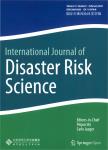Towards Quantitatively Understanding the Complexity of Social-Ecological Systems——From Connection to Consilience
Towards Quantitatively Understanding the Complexity of Social-Ecological Systems——From Connection to Consilience作者机构:State Key Laboratory of Earth Surface Processes and Resource Ecology Beijing Normal University Academy of Disaster Reduction and Emergency Management Beijing Normal University School of Engineering University of Warwick Key Laboratory of Environmental Change and Natural Disaster Ministry of Education Beijing Normal University ASU-SFI Center for Biosocial Complex Systems Arizona State University School of Life Sciences and School of Sustainability Arizona State University Stuttgart Research Center for Interdisciplinary Risk and Innovation Studies University of Stuttgart Global Climate Forum
出 版 物:《International Journal of Disaster Risk Science》 (国际灾害风险科学学报(英文版))
年 卷 期:2017年第8卷第4期
页 面:343-356页
核心收录:
学科分类:0709[理学-地质学] 08[工学] 0303[法学-社会学] 0832[工学-食品科学与工程(可授工学、农学学位)] 0830[工学-环境科学与工程(可授工学、理学、农学学位)] 083001[工学-环境科学] 1201[管理学-管理科学与工程(可授管理学、工学学位)] 0708[理学-地球物理学] 0705[理学-地理学] 0837[工学-安全科学与工程] 0706[理学-大气科学] 0813[工学-建筑学] 0704[理学-天文学] 0833[工学-城乡规划学]
基 金:supported in part by the National Key Research and Development Programme (Grant No. 2016YFA0602404) the National Natural Science Foundation of China (Grant No. 61472041)
主 题:Complex networks Consilience degree Co-evolution Disaster risk reduction Social-ecological systems
摘 要:The complexity of social-ecological systems(SES) is rooted in the outcomes of node activities connected by network topology. Thus far, in network dynamics research, the connectivity degree(CND), indicating how many nodes are connected to a given node, has been the dominant concept. However, connectivity focuses only on network topology, neglecting the crucial relation to node activities, and thereby leaving system outcomes largely unexplained. Inspired by the phenomenon of ‘‘consensus of wills and coordination of activities often observed in disaster risk management, we propose a new concept of network characteristic, the consilience degree(CSD),aiming to measure the way in which network topology and node activities together contribute to system outcomes. The CSD captures the fact that nodes may assume different states that make their activities more or less compatible.Connecting two nodes with in/compatible states will lead to outcomes that are un/desirable from the perspective of the SES in question. We mathematically prove that the CSD is a generalized CND, and the CND is a special case of CSD. As a general, fundamental concept, the CSD can facilitate the development of a new framework of network properties, models, and theories that allows us to understand patterns of network behavior that cannot be explained in terms of connectivity alone. We further demonstrate that a co-evolutionary mechanism can naturally improve the CSD. Given the generality of co-evolution in SES, we argue that the CSD is an inherent attribute rather than an artificial concept, which underpins the fundamental importance of the CSD to the study of SES.



